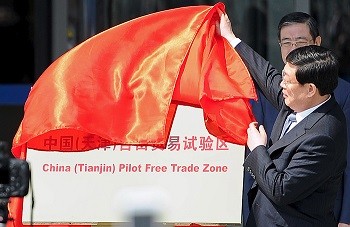The Chinese government has officially launched three new free trade zones (FTZs) on April 21, Tuesday, and granted new business licenses to various registered enterprises in the zones.
The launch ceremonies were attended by senior officials of the provincial governments where the FTZs were located.
The Global Times said that the launching of the three FTZs came 18 months after the country's first FTZ was launched in Shanghai.
The new FTZs are China Pilot Free Trade Zone in Guangdong, Tianjin and Fujian.
Xinhua News Agency reported that the total area of the country's FTZs has now expanded from 28.78 square kilometers to about 480 square kilometers.
Zhu Xiaodan, governor of Guangdong Province, said that the Guangdong FTZ will become a demonstration zone where Guangdong firms can tie up with enterprises in Hong Kong and Macao.
Zhu added that the new FTZ will also serve as a strategic hub for the country's "One Belt, One Road" initiative.
On the other hand, Su Shulin, governor of Fujian Province, said that Fujian will take advantage of its strategic geographic position for potential cooperation with Taiwan, while the Tianjin municipal government said the Tianjin FTZ will work to integrate the Beijing-Tianjin-Hebei region.
The Global Times quoted Zhang as saying that the three FTZs have their own characteristics, where the Tianjin FTZ will focus on the finance leasing business, while the Guangdong and Fujian FTZs will try to attract service sector businesses from Hong Kong and Taiwan, respectively.
Wang Jun, an economist at the China Center for International Economic Exchanges, noted that the Tianjin FTZ has the potential to attract high-end manufacturing businesses.
Zhang added that businesses, particularly foreign-backed companies, will be interested in the preferential policies in the new FTZs since they can set up new businesses that are not allowed outside the zones.
The State Council released an updated list of foreign investment not allowed in the three FTZs.



























